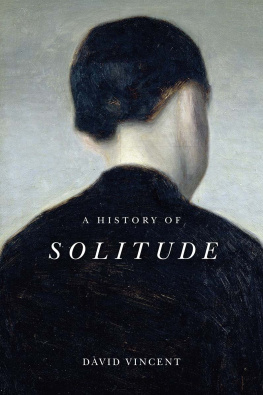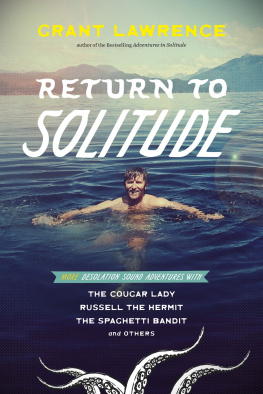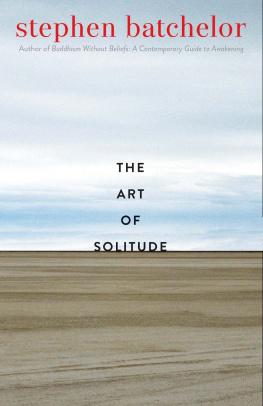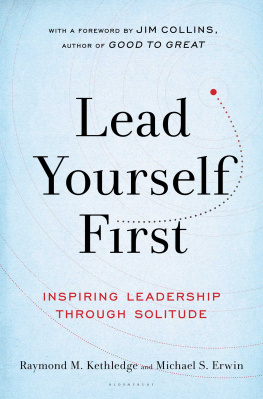
To the memory of Veronica Weedon, 19192017
A HISTORY OF SOLITUDE
DAVID VINCENT
polity
Copyright David Vincent 2020
The right of David Vincent to be identified as Author of this Work has been asserted in accordance with the UK Copyright, Designs and Patents Act 1988.
First published in 2020 by Polity Press
Polity Press
65 Bridge Street
Cambridge CB2 1UR, UK
Polity Press
101 Station Landing
Suite 300
Medford, MA 02155, USA
All rights reserved. Except for the quotation of short passages for the purpose of criticism and review, no part of this publication may be reproduced, stored in a retrieval system or transmitted, in any form or by any means, electronic, mechanical, photocopying, recording or otherwise, without the prior permission of the publisher.
ISBN-13: 978-1-5095-3660-3
A catalogue record for this book is available from the British Library.
Library of Congress Cataloging-in-Publication Data
Names: Vincent, David, 1949- author.
Title: A history of solitude / David Vincent.
Description: Cambridge, UK ; Medford, MA : Polity, 2020. | Includes
bibliographical references and index. | Summary: A wide-ranging social
history of why and how people have chosen to be alone-- Provided by
publisher.
Identifiers: LCCN 2019043747 (print) | LCCN 2019043748 (ebook) | ISBN 9781509536580 | ISBN 9781509536603 (epub)
Subjects: LCSH: Solitude.
Classification: LCC BJ1499.S65 V56 2020 (print) | LCC BJ1499.S65 (ebook) | DDC 155.9/2--dc23
LC record available at https://lccn.loc.gov/2019043747
LC ebook record available at https://lccn.loc.gov/2019043748
The publisher has used its best endeavours to ensure that the URLs for external websites referred to in this book are correct and active at the time of going to press. However, the publisher has no responsibility for the websites and can make no guarantee that a site will remain live or that the content is or will remain appropriate.
Every effort has been made to trace all copyright holders, but if any have been overlooked the publisher will be pleased to include any necessary credits in any subsequent reprint or edition.
For further information on Polity, visit our website: politybooks.com
ACKNOWLEDGEMENTS
This book, as with any other historical enterprise, is the product of lone endeavour and collective support. I am particularly grateful to Barbara Taylor, both for the funded network she has established on the history of solitude and for sharing her own knowledge and expertise. Her forthcoming study of the subject in the early-modern era will be a necessary complement to this exercise. The Pathologies of Solitude seminars have been a useful location for testing the ideas and conclusions of my work. John Naughton has supplied networked support through the projects of the Cambridge Centre for Research in the Arts, Social Sciences and Humanities. I thank him for his encouragement and hospitality, as well as his unrivalled expertise on the digital revolution and its implications. The visiting fellows at CRASSH have been a source of debate and information. Colleagues at the Open University have read and commented on draft chapters and made available their specialized knowledge, with particular thanks to Amanda Goodrich, Ros Crone, and John Wolffe. I have benefited from discussions with Patrick Joyce, Leslie Howsam, Kathryn Hughes, and Isabel Rivers. Andrew Mackenzie-McHarg and Anne Vila helped me understand Johann Zimmermann and his writings. Claudia Hammond lent me material from her impressive BBC/Welcome Trust collaborations. The progress of this project has been discussed in the generous company of Brenda and James Gourley, and Seija and Graham Tattersall. Charlotte Vincent, as so often over so many years, has been a sustaining critic, arguing through the books ideas, supporting its labour and reading every word for accurate expression. At Polity, Pascal Porcherons persistent enthusiasm for this project has much to do with its completion. The care given by Justin Dyer to the preparation of this text has been exemplary.
This book has been researched in the deep quiet of the rare books rooms in the British Library and the Cambridge University Library, and I thank their staff for their patience and efficiency. As the project was commencing one Armistice Day, the public address system in the latters Rare Books Room made the oddly unfeasible request of its readers that they observe a silence for the fallen. Even in the depths of a library, solitude has to be managed.
The book was written in a converted pigsty in my garden. It is twenty steps from my desk to my house, from my own company to that of my wife and the intermittent presence of children, grandchildren and friends. To be able to make that journey from one location to the other, from productive solitude to the most profound sociability, is the privilege of my life.
A History of Solitude is dedicated to Veronica Weedon ne More, to whom I had the good fortune of being related by marriage. After an eventful war-service, which included work at Bletchley Park, she married and had a family, but was early widowed. Her subsequent life throughout nearly six decades, latterly in a mountain village in Majorca, was an exemplary demonstration of how to maintain a balance between her own company and a wide range of family, friends, and outside interests. She was a great reader, and in turn the author of four books, the first published when she was eighty-five. I hope she would have enjoyed this one.
Shrawardine, autumn 2019
INTRODUCTION: SOLITUDE CONSIDERED
Zimmerman on Solitude
In 1791, the first full-length study of solitude for more than four centuries was published in England. Solitude Considered with Respect to its Dangerous Influence Upon the Mind and Heart was a shortened translation of the four-volume ber die Einsamkeit, written in 1784 and 1785 by Johann Georg Zimmermann, personal physician to George III in Hanover and to the late Frederick the Great. The book was not universally welcomed. An essay on solitude, in 380 pages, grumbled the Gentlemans Magazine, seems to require confinement in a solitary cell to read it.
The topic was inherently controversial. Various are the opinions concerning Solitude, observed the Critical Review in its response to the publication. By some it is considered as the parent of all human excellence and felicity; by others, as the depraver of the faculties, and the source of disquietude: and those who can endure it have been stated to be either above or below the standard of humanity.
The proper condition of man, and woman, is the subject of this history. It seeks to understand how people over the last two centuries have conducted themselves in the absence of company. Zimmermanns treatise was a way station in a debate about social engagement and disengagement that stretches back to classical times and has acquired new urgency in our own era. His book was rapidly translated because both its subject matter and its evidential frame of reference were familiar to any educated European of the period. It stood in the mainstream of one of the longest debates in Western culture and at the same time constituted a critical reaction to a period of unprecedented change. Zimmermann was deeply immersed in the urban bourgeois society that was beginning to recognize itself as an historical force, and in his old age witnessed the French Revolution taking place on the other side of his native Jura.
The point of departure and return in
Next page














